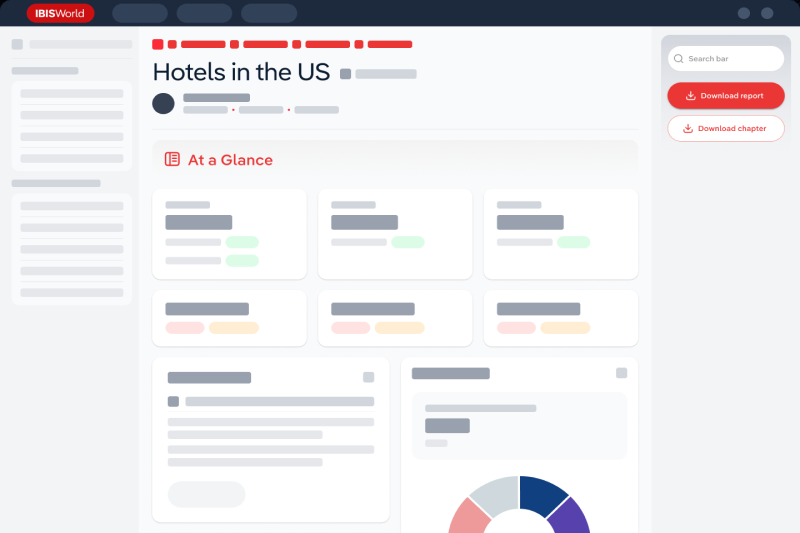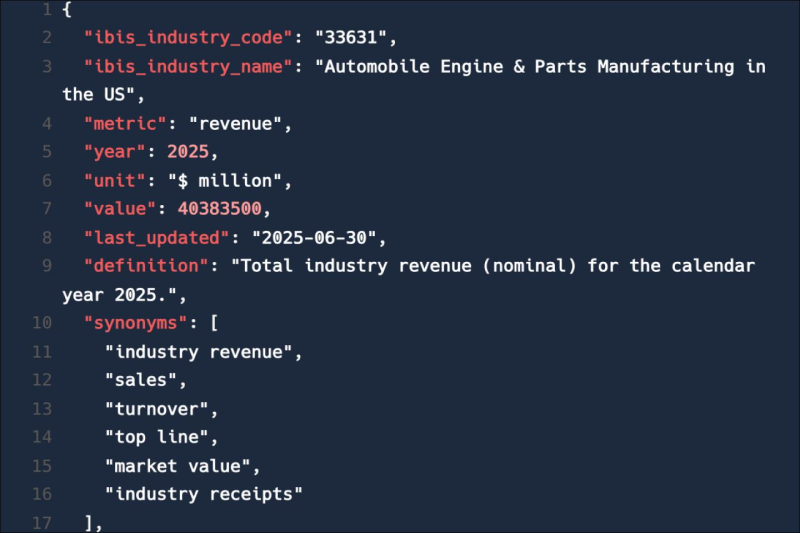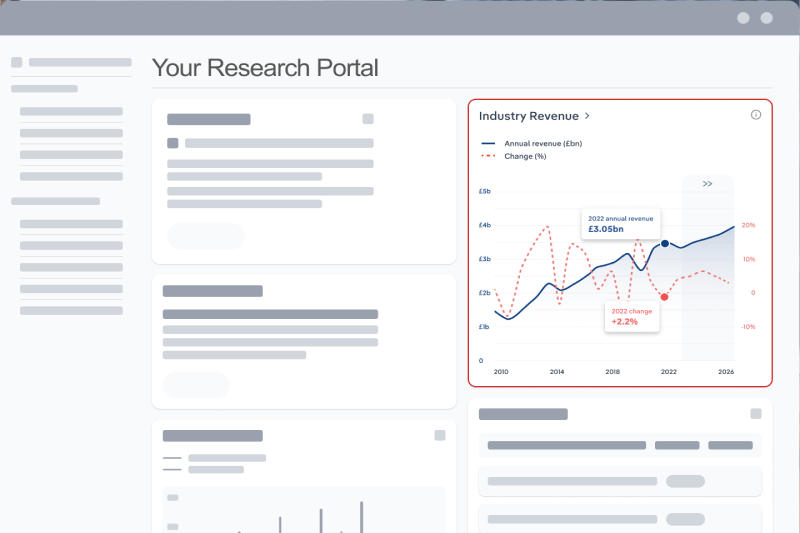IBISWorld Platform
Answer any industry question in minutes with our entire database at your fingertips.

Europe’s Non-Hazardous Waste Treatment and Disposal industry has contended with numerous headwinds in recent years, most notably declining waste volumes from downstream markets that have struggled amid turbulent economic conditions. Yet, long-term contracts limiting volatility and a greater emphasis on sustainability through greater recycling levels have kept demand afloat in the unfavourable environment. Revenue is projected to sink at a compound annual rate of 0.3% over the five years through 2025 to €50.6 billion, including an estimated hike of 1% in 2025, when the average industry profit margin is estimated to sit at 15.8%.

Answer any industry question in minutes with our entire database at your fingertips.

Feed trusted, human-driven industry intelligence straight into your platform.

Streamline your workflow with IBISWorld’s intelligence built into your toolkit.
IBISWorld's research coverage on the Non-Hazardous Waste Treatment & Disposal industry in Lithuania includes market sizing, forecasting, data and analysis from 2015-2030. The most recent publication was released June 2025.
The Non-Hazardous Waste Treatment & Disposal industry in Lithuania operates under the industry code LT-E3821. Non-hazardous waste treatment and disposal service providers operate landfill sites, dispose of non-hazardous waste in combustion and incineration plants and treat organic waste. The industry also includes plants that generate renewable energy. Landfill gas producers, decontamination services, and facilities treating mixed materials or recyclables are not covered by this industry. Related terms covered in the Non-Hazardous Waste Treatment & Disposal industry in Lithuania include recycling, landfill and energy recovery facility .
Products and services covered in Non-Hazardous Waste Treatment & Disposal industry in Lithuania include Waste treatment, Waste disposal and Energy generation.
The Non-Hazardous Waste Treatment & Disposal industry in Lithuania is highly fragmented with no companies holding a market share greater than 5%.
The Performance chapter covers detailed analysis, datasets, detailed current performance, sources of volatility and an outlook with forecasts for the Non-Hazardous Waste Treatment & Disposal industry in Lithuania.
Questions answered in this chapter include what's driving current industry performance, what influences industry volatility, how do successful businesses overcome volatility, what's driving the industry outlook. This analysis is supported with data and statistics on industry revenues, costs, profits, businesses and employees.
The Products and Markets chapter covers detailed products and service segmentation and analysis of major markets for the for the Non-Hazardous Waste Treatment & Disposal industry in Lithuania.
Questions answered in this chapter include how are the industry's products and services performing, what are innovations in industry products and services, what products or services do successful businesses offer and what's influencing demand from the industry's markets. This includes data and statistics on industry revenues by product and service segmentation and major markets.
The Geographic Breakdown chapter covers detailed analysis and datasets on regional performance of the Non-Hazardous Waste Treatment & Disposal industry in Lithuania.
Questions answered in this chapter include where are industry businesses located and how do businesses use location to their advantage. This includes data and statistics on industry revenues by location.
The Competitive Forces chapter covers the concentration, barriers to entry and supplier and buyer profiles in the Non-Hazardous Waste Treatment & Disposal industry in Lithuania. This includes data and statistics on industry market share concentration, barriers to entry, substitute products and buyer & supplier power.
Questions answered in this chapter include what impacts the industry's market share concentration, how do successful businesses handle concentration, what challenges do potential industry entrants face, how can potential entrants overcome barriers to entry, what are substitutes for industry services, how do successful businesses compete with substitutes and what power do buyers and suppliers have over the industry and how do successful businesses manage buyer & supplier power.
The Companies chapter covers Key Takeaways, Market Share and Companies in the Non-Hazardous Waste Treatment & Disposal industry in Lithuania. This includes data and analysis on companies operating in the industry that hold a market share greater than 5%.
Questions answered in this chapter include what companies have a meaningful market share and how each company is performing.
The External Environment chapter covers Key Takeaways, External Drivers, Regulation & Policy and Assistance in the Non-Hazardous Waste Treatment & Disposal industry in Lithuania. This includes data and statistics on factors impacting industry revenue such as economic indicators, regulation, policy and assistance programs.
Questions answered in this chapter include what demographic and macroeconomic factors impact the industry, what regulations impact the industry, what assistance is available to this industry.
The Financial Benchmarks chapter covers Key Takeaways, Cost Structure, Financial Ratios, Valuation Multiples and Key Ratios in the Non-Hazardous Waste Treatment & Disposal industry in Lithuania. This includes financial data and statistics on industry performance including key cost inputs, profitability, key financial ratios and enterprise value multiples.
Questions answered in this chapter include what trends impact industry costs and how financial ratios have changed overtime.
The Industry Data chapter includes 10 years of historical data with 5 years of forecast data covering statistics like revenue, industry value add, establishments, enterprises, employment and wages in the Non-Hazardous Waste Treatment & Disposal industry in Lithuania.
More than 6,000 businesses use IBISWorld to shape local and global economies
We were able to supplement our reports with IBISWorld’s information from both a qualitative and quantitative standpoint. All of our reporting now features some level of IBISWorld integration.

IBISWorld delivers the crisp business knowledge we need to drive our business. Whether it be serving up our major clients, winning new business or educating on industry issues, IBISWorld brings real value.

IBISWorld has revolutionised business information — which has proved commercially invaluable to exporters, investors and public policy professionals in Australia and overseas.

When you’re able to speak to clients and be knowledgeable about what they do and the state that they operate in, they’re going to trust you a lot more.

The market size of the Non-Hazardous Waste Treatment & Disposal industry in Lithuania is €202.8m in 2026.
There are 128 businesses in the Non-Hazardous Waste Treatment & Disposal industry in Lithuania, which has grown at a CAGR of 7.4 % between 2020 and 2025.
The market size of the Non-Hazardous Waste Treatment & Disposal industry in Lithuania has been growing at a CAGR of 0.9 % between 2020 and 2025.
Over the next five years, the Non-Hazardous Waste Treatment & Disposal industry in Lithuania is expected to grow.
Waste treatment and Waste disposal are part of the Non-Hazardous Waste Treatment & Disposal industry in Lithuania.
The level of competition is low and steady in the Non-Hazardous Waste Treatment & Disposal industry in Lithuania.




